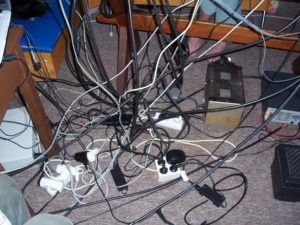
V roku 2005 vyvrcholil u nás vývoj, ktorý bol predznamenaný významnými zmenami legislatívy vo svete aj v Európe. Jedným z veľmi silných impulzov bola svetová rádiokomunikačná konferencia WRC 2003, ktorá rozhodla, že skúšky znalosti telegrafie prestávajú byť celosvetovo platnou podmienkou pre vstup rádioamatérov na KV pásma a posúdenie účelnosti takejto skúšky zverila národným telekomunikačným správam. Bezprostredne na to zareagovalo Nemecko, ktoré vpustilo na KV pásma viac než 30 tisíc operátorov bez telegrafnej skúšky. A záhy zareagovala aj Európska konferencia poštových a telekomunikačných správ (CEPT), ktorá pôvodné dve triedy medzinárodných povolení CEPT (Class A so skúškou, Class B bez skúšky telegrafie) zlúčila do jednej triedy, pre ktorú znalosť telegrafie nie je podmienkou. Obe skutočnosti predurčili vývoj v rade európskych krajín, ktorý sa postupne stáva normou, hoci nezáväznou: zrušenie skúšok z telegrafie a výrazné zníženie počtu operátorských tried.
Treba zdôrazniť, že tieto tendencie sú do istej miery výsledkom snáh medzinárodnej rádioamatérskej organizácie IARU, úrady ich však zavádzajú do praxe rýchlosťou, akou by na podnety samotných rádioamatérov nikdy nereagovali. Je zrejmé, že primárnym dôvodom sú snahy o zjednodušenie administratívnych procedúr a zníženie štátnych výdavkov. Nie je to nič nové: podobne sa snahy o úspory dotkli rádioamatérov v USA v sedemdesiatych rokoch s nástupom Reaganovej administratívy, a nepriniesli nakoniec zlo, ale naopak to, čo americkým rádioamatérom závidíme: systém koncesných skúšok postavený na práci dobrovoľných skúšobných komisárov.
V Európe však obvykle berieme veci za ten podivnejší koniec, čo ukazuje súčasná snaha britskej administratívy previesť povoľovanie amatérskych staníc do režimu zodpovedajúceho našim generálnym licenciám, teda možnosť vysielať bez skúšok, na základe jednoduchej žiadosti o registráciu. To si len ťažko môže priať aj ten rádioamatér, ktorý má voči nováčikom náruč najotvorenejšiu. Snahy európskych úradníkov šetriť si prácu a štátu výdavky (aby zostalo viac na platy úradníkov) teda začínajú naberať smer, z ktorého možno mať obavy.

Konkrétne v ČR sa tieto tendencie časovo stretli s dokončovaním normy završujúcej proces harmonizácie telekomunikačnej legislatívy ČR s legislatívou EÚ, zákona o elektronických komunikáciách. Príprava vykonávacích vyhlášok k zákonu, ktoré sa týkali rádioamatérov, ukázala, že aj naši úradníci v snahe o liberalizáciu, harmonizáciu a unifikáciu výrazne predbehli impulzy vychádzajúce z radov samotných rádioamatérov. Český radioklub ako organizácia pre všetkých rádioamatérov k vývoju nezaujímal vyhranené stanovisko s vedomím, že medzi členmi sú priaznivci aj odporcovia zmien v celkom vyrovnanom pomere. Vychádzal však aj z toho, že ak je potrebné pootvorenie vstupných dverí do rádioamatérskeho sveta pre nových záujemcov, a tomu zodpovedá ústup od rigidného trvania na skúške z telegrafie, je súčasne nevyhnutné ochrániť CW pásma pred pokusmi tých, ktorí telegrafiu neovládajú.
V tomto duchu spracovaný návrh nových predpisov pobúril časť krajne konzervatívne orientovaných členov natoľko, že sa dokonca na zjazde roku 2004 pokúsili o prevzatie vedenia ČRK. Tento pôvodný návrh ČRK bol však vývojom posledných mesiacov prekonaný. Požiadavky úradov na čo najdôslednejšiu harmonizáciu našich predpisov s európskymi boli nakoniec zo strany ČRK akceptované. Najmä preto, že v situácii, keď rad významných európskych krajín vrátane našich najbližších susedov opúšťa diferencované požiadavky na skúšky rádioamatérov, by snahy o konzervatívne riešenie „aspoň u nás“ vecne nepriniesli absolútne nič, a dostali by sme sa do neprijateľnej situácie, keď by prístup na amatérske pásma bol u nás ťažší než v iných porovnateľných krajinách.
Jedna etapa vývoja legislatívy pre rádioamatérov sa teda zavŕšila, a k 1. máju 2005 vstupuje do platnosti rad nových predpisov, z ktorých nás najviac zaujíma najmä zákon č. 127/2005 Zb. o elektronických komunikáciách, vyhláška č. 155/2005 Zb. o tvorbe volacích značiek, identifikačných čísel a kódov, ich používaní a o druhoch rádiokomunikačných služieb, pre ktoré sú vyžadované, vyhláška č. 156/2005 Zb. o technických a prevádzkových podmienkach amatérskej rádiokomunikačnej služby a vyhláška č. 157/2005 Zb. o náležitostiach prihlášky ku skúške na preukázanie odbornej spôsobilosti k obsluhe vysielacích rádiových zariadení, o rozsahu znalostí potrebných pre jednotlivé druhy odbornej spôsobilosti, o spôsobe vykonávania skúšok, o druhoch preukazov odbornej spôsobilosti a dobe ich platnosti.
Zákon o elektronických komunikáciách č. 127/2005 Zb. je veľmi dlhý a komplikovaný predpis, ktorý rieši nesmierne rozsiahlu problematiku telekomunikácií, a rádioamatérov sa bezprostredne týka len na niekoľkých miestach. Odporúčame oboznámiť sa najmä s ustanoveniami: §§ 17–19 – individuálne oprávnenie k využívaniu rádiových kmitočtov, § 26 – odborná spôsobilosť, § 89 – dôvernosť komunikácií, § 100 – ochrana elektronických komunikácií, § 113 – štátna kontrola elektronických komunikácií, §§ 118–119 – správne delikty, § 120 – priestupky, § 122 – vzťah k správnemu poriadku, § 123 – opravné prostriedky.
Platnosť oprávnenia je možné teraz opäť predĺžiť (ako pred dobou platnosti zákona č. 151/2000 Zb.), obvykle na dobu, na ktorú bolo vydané.
Vyhláška č. 156/2005 Zb., prevádzkový predpis, prináša tieto zmeny:
-
Štruktúra tried sa úplne mení: súčasné triedy A, B, C a D sa zlúčili do jedinej triedy A – HAREC (podľa výkladu MI ČR z 29.4.2005), ktorej držitelia môžu pracovať výkonom 750 W na všetkých u nás povolených pásmach (nestanoví‑li tabuľky v prílohe vyhlášky pre niektoré frekvenčné segmenty iný výkon).
-
Novovzniká trieda N – NOVICE s povoleným výkonom 10 W a s prístupom na úseky KV pásiem 160, 80, 15 a 10 m a na VKV pásma od 2 m vyššie. Používa volacie značky s prefixom OK9 a trojpísmenovým sufixom.
-

Telegrafné kľúče Trieda A je harmonizovaná podľa HAREC a má teda platnosť v Európe a ďalších štátoch, trieda N zatiaľ harmonizovaná nie je. CEPT však pripravuje aj pre tento typ tried zásady harmonizácie, uvedený handicap teda časom pravdepodobne padne.
-
Vtipne a bez potreby výnimiek bola vyriešená potreba vyšších výkonov v súťažiach a pri EME prevádzke: operátori triedy A môžu pracovať s 1 500 W z intravilánu a so 3 000 W z extravilánu.
-
Povolené výkony fakticky klesli: v predchádzajúcich predpisoch boli výkonové hranice stanovené ako efektívne, nový predpis ich chápe ako špičkové.
-
Vedenie staničného denníka je záväzné iba u klubových staníc.
-
Uvádzanie údajov „portable“ či „mobil“ nie je záväzné, iba v súťažiach; výnimka u expedíčnej prevádzky (pravdepodobne omylom) vypadla.
-
Druhy prevádzky v jednotlivých úsekoch pásiem sú stanovené záväzne podľa odporúčaní IARU.
-
Osoba bez preukazu operátora smie vysielať iba z klubovej stanice, pod dohľadom a iba v triede N.
-
Po prvýkrát u nás predpisy poznajú (a teda uznávajú) prevádzku neobsluhovaných staníc, rozumejú sa nimi prevádzače, majáky a paketové uzly a obmedzujú ich výkon na 50 W.
-
Povolenia vydané podľa predchádzajúcich predpisov zostávajú v platnosti do doby na nich uvedenej a považujú sa za individuálne oprávnenie k využívaniu rádiových kmitočtov podľa zákona č. 127/2005 Zb. operátorov triedy A podľa vyhlášky č. 156/2005 Zb. (podľa výkladu MI ČR z 29.4.2005).
-
Výkony viacerých vysielacích zariadení, ktoré vysielajú tú istú moduláciu na tom istom kmitočte, sa pre potreby posúdenia splnenia výkonových limitov sčítavajú. V § 4 ods. 5 vyhlášky je toto pravidlo síce obmedzené len na bežnú prevádzku, podľa zatiaľ neoficiálnych informácií však došlo k preklepu (správne znenie má byť „Výkony uvedené v odstavcoch 2 a 4 …“), ktorý bude opravený štandardným postupom opravy tlačovej chyby v Zbierke zákonov.

Vyhláška č. 157/2005 Zb., kvalifikačný predpis, je spoločná pre všetky rádiokomunikačné služby:
-
Pozná iba preukazy operátora A – HAREC a N – NOVICE (preukaz N zatiaľ nemá medzinárodnú platnosť).
-
Nie je stanovený minimálny vek ani minimálne vzdelanie uchádzača o preukaz operátora, po prvýkrát teda u nás nie je stanovený minimálny vek koncesionára.
-
Preukaz má pri amatérskej službe trvalú časovú platnosť.
-
Hoci súčasťou skúšok už nie je skúška z telegrafie, uchádzač ju môže zložiť na vlastnú žiadosť (praktický význam pre tých, ktorí by chceli uznanie skúšok získaných v ČR v iných krajinách, ktoré znalosti telegrafie vyžadujú).
-
Obsah skúšok musí primerane zodpovedať odporúčaniam IARU Reg.I.
-
ČTÚ je konečne povinný zverejniť znenie skúšobných testov.
-
Správne poplatky zostávajú nezmenené: vystavenie preukazu operátora stojí 400 Kč, vystavenie koncesie 500 Kč, novovznikol poplatok za predĺženie platnosti koncesie 200 Kč.
V roku 2000 sme v článku „Malý Čech sa dočkal“ konštatovali, že úroveň komunikácie medzi ČRK a ČTÚ je mizerná. Za päť rokov sa ČRK podarilo túto situáciu výrazne zlepšiť. Máme možnosť konzultovať s vysokými predstaviteľmi ČTÚ a podobné kontakty sme vybudovali aj na novom ministerstve informatiky. To samozrejme neznamená, že každá naša žiadosť je automaticky splnená, môžeme však diskutovať, vysvetľovať a dostávať vysvetlenia.

Napriek pokroku, aj napriek tomu, že môžeme v predpisoch ukázať miesta, ktoré sú úspechom našich návrhov, musíme priznať, že kvalita predpisov prijatých v tomto roku, ak posudzujeme kvalitu právnej normy (nie to, čo konkrétne dáva alebo berie), je najnižšia od roku 1989. Dôvodom nie je neochota alebo nekompetentnosť úradníkov, ale samotná podstata rádioamatérstva ako telekomunikačnej činnosti a nespočet partnerov, ktorých rádioamatéri ako jedni z mnohých podielnikov na telekomunikačných činnostiach majú.
Jednoducho povedané: regulovať celé telekomunikácie jediným zákonom prestáva byť možné. Rôzne záujmy a úlohy má štát, rôzne médiá, rôzni komerční poskytovatelia telekomunikačných služieb, školstvo, veda, doprava, energetika, armáda, polícia či tajné služby. Každý z týchto okruhov predstavuje komplikovanú spleť vzťahov a potrieb a na zákone o elektronických komunikáciách je vidno, že dostať všetkých „pod jednu strechu“ je možné len za cenu nesmiernych krkolomností.
S legislatívnym procesom v demokratickej spoločnosti je neoddeliteľne spojené lobovanie za konkrétne záujmy. Rádioamatéri tiež lobovali: v ZoEK nájdete niekoľko miest s vetou typu „to sa nevyžaduje u prevádzkovateľov amatérskej rádiokomunikačnej služby“ – ide o dopad lobovania ČRK a ďalších rádioamatérov. Nelobovali však iba rádioamatéri.
S nadsádzkou možno povedať, že keď sa pripravuje materiál tak rozsiahly, na ktorý spájajú svoje očakávania desiatky a stovky odborníkov, každý úradník má za chrbtom desiatky a stovky lobistov, a za takých okolností kvalitný zákon jednoducho nemôže vzniknúť. Pamätáme si, koľko práce dalo poslancov a senátorov zladiť návrh ZoEK s potrebami digitálneho pozemného TV vysielania. Príliš široký záber, príliš veľa lobovania a príliš veľa zhonu v závere legislatívnej práce spôsobilo predpisy nepriehľadné a vnútorne nekonzistentné, s množstvom omylov.
Ešte v deväťdesiatych rokoch sa úvahy o samostatnom zákone o amatérskej službe zdali byť zbytočným luxusom. Skúsenosti z poslednej kampane k príprave telekomunikačných predpisov však ukazujú, že ide o cieľ, o ktorý stojí za to usilovať. Dobrou ukážkou je záludnosť, ktorá z neznámych dôvodov zakotvila v návrhu § 100 ZoEK – návrh pravidla, že ak zdrojom rušenia je amatérska stanica, bude postihnutá bez objektívneho skúmania prípadu, na ktorý zákon inak pamätá v prípade rušenia z akéhokoľvek iného zdroja. V tak rozsiahlej materiáli mohla vec ľahko uniknúť.
Našťastie sa spojením síl rádioamatérov a ich politických kontaktov podarilo nebezpečenstvo odvrátiť, rovnaká situácia sa však môže kedykoľvek v budúcnosti, napríklad pri novelách zákona, zopakovať. Oddelená úprava rádioamatérskych záležitostí by sledovanie takýchto úkladov určite uľahčila. Český radioklub by mal začať usilovať o túto zmenu čo najskôr.
© OK1XU, 2005
